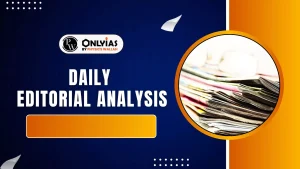Recent allegations of “criminal fraud” against the Election Commission of India (ECI) necessitate a thorough examination of existing flaws and immediate systemic reforms.
Allegations of Electoral Malpractices
- There are serious allegations of “criminal fraud” against the Election Commission of India, claiming that over 1 lakh fake votes were created in the Mahadevapura Assembly segment of the Bangalore Central Lok Sabha constituency.
Key points of alleged electoral malpractices
- Multiple Registrations in the Same Constituency: Many voters were allegedly registered multiple times within the same constituency, appearing at different booth numbers.
- If verified, this represents a serious violation of the “one person, one vote” principle.
- Identical Electors Photo Identity Card (EPIC) Numbers Across Different States: The same unique voter identification numbers were found in different states, such as Maharashtra, Rajasthan, and Uttar Pradesh, which should not occur as EPIC numbers are meant to be unique.
- While the ECI has previously addressed these as anomalies due to lack of complete digitisation, the recurrence is concerning.
- Improbably Large Numbers of Voters at Single Addresses: An unusually high number of voters were listed at single residential addresses, which is highly improbable even for joint families.
- Multiple Votes by the Same Person on Booth Slips: Party workers allegedly found booth slips indicating that the same person had cast multiple votes at a single booth due to duplication in records.
- It is alleged that these discrepancies were not isolated to Mahadevapura.
Election Commission of India’s Response and Systemic Issues
- Demanding Evidence Under Oath: The ECI demanded that evidence be submitted “under oath,” a requirement that is seen as unnecessarily defensive.
- Attributing Blame to Political Parties: The ECI attributed electoral discrepancies to the failure of political parties to raise concerns during the voter registration process.
- However, the ECI provides voter information in bulky, scanned image PDFs, which are difficult for political parties and civil society organisations to verify or search.
- Reliance on Self-Declarations: The ECI’s current voter registration process heavily relies on self-declarations, lacking robust door-to-door verification, which is considered the most reliable method for maintaining accurate voter rolls.
- Issues with Special Intensive Revision (SIR): The ECI’s Special Intensive Revision (SIR) exercise in Bihar, intended to improve electoral roll accuracy through house-to-house verification, was implemented in a rushed manner, leading to poor execution.
- This haste resulted in issues such as a disproportionately higher deletion of women electors compared to men, possibly due to
- low literacy rates among women in Bihar (55% as per National Family Health Survey) and
- difficulties in providing documentation.
Broader Challenges in Electoral Administration
Beyond the specific allegations, several systemic issues within the ECI’s administration demand urgent attention:
- Lax Enforcement: Rules governing campaign expenditure and the Model Code of Conduct are not strictly enforced. This leads to candidates spending well beyond prescribed limits and engaging in hate speeches or distributing freebies.
- Limited VVPAT Tallying: Verification of Voter Verified Paper Audit Trail (VVPAT) slips with Electronic Voting Machine (EVM) records is currently done only for a very small, randomly chosen sample of five booths per constituency.
- This sample size is insufficient to ensure widespread confidence.
- Inadequate Technical Safeguards for VVPATs: There are insufficient technical safeguards for symbol loading in VVPAT machines, and the process lacks independent auditing.
- The ECI also shows resistance to independent expert verification of EVM’s technical safeguards.
- Lack of Transparency in Polling Booth Footage and Turnout Data: The ECI is unwilling to retain or easily provide CCTV footage from polling booths to the public.
- There are often delays in publishing final voter turnout figures, which erodes transparency.
- Erosion of Institutional Trust: The ECI’s tendency to view criticism as an attack on its integrity rather than an opportunity for improvement undermines public confidence in its impartiality and transparency.
- Appointment of Election Commissioners: The current process for appointing Election Commissioners has sidelined the Supreme Court’s recommendation to include the Chief Justice of India in the selection panel, further raising concerns about impartiality.
Measures To Strengthen India’s electoral democracy
- Comprehensive Voter Roll Auditing: Implement robust, continuous, and systematic door-to-door verification drives for electoral rolls to identify and remove duplicate or erroneous entries, while ensuring no eligible voters are excluded.
- Enhanced Data Transparency: The ECI must release voter information and other relevant electoral data in structured, searchable text formats, rather than scanned image PDFs, to facilitate easier verification by political parties and civil society.
- Improved Technical Safeguards and Audits:
- Increase the sample size for VVPAT-EVM tallying beyond the current five booths.
- Ensure independent auditing of symbol loading in VVPAT machines.
- Develop comprehensive audit trails of EVM commands and strengthen security protocols.
- Stricter Enforcement of Electoral Regulations: The ECI must stringently enforce campaign finance regulations and the Model Code of Conduct to curb excessive spending, hate speeches, and illegal inducements during elections.
- Timely and Accessible Information: Ensure prompt release of final voter turnout figures and make CCTV footage from polling booths readily available to voters and the public.
- Fostering Trust Through Dialogue and Response: The ECI must adopt a more proactive and responsive approach to allegations, providing detailed and transparent explanations to build trust, rather than resorting to defensive stances.
Conclusion
The ECI must embrace scrutiny as a means to strengthen democratic institutions, as the continued erosion of public confidence in electoral processes poses a far greater risk to democratic governance than any specific allegation of malpractice.
- India’s growth as a vibrant democracy depends on addressing these flaws decisively.
![]() 9 Aug 2025
9 Aug 2025
